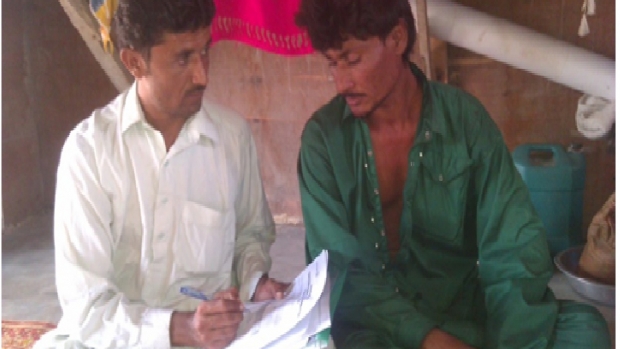Grants :: Small Grant Facilities :: Enhancing Disaster Preparedness in Coastal Communities
Enhancing Disaster Preparedness in Coastal Communities

Enhancing Disaster Preparedness in Coastal Communities
Objectives
- To minimise the loss of life and livelihood from natural disasters in four coastal villages of Rehri Union Council.
- To ensure that the communities are aware of, and prepared for, such disasters, and are linked with the Provincial Disaster Management Authority (PDMA).
Background
Rehri Union Council is one of Karachi’s oldest settlements with approximately fifteen thousand residents, mostly engaged in fishing, though other occupations such as boat renting and repairing, and selling food items, are not uncommon. Although the Rehri Creek, which is within Karachi district, is dominated by mangroves, in recent years, heavy pollution in the coastal areas has destroyed much of the natural vegetation and marine life. In addition to this, human activities such as cutting mangroves for fuel and fodder mean that this area of the coast has become increasingly vulnerable to natural disasters like cyclones which have occurred several times in the past century. The remoteness of the area and the lack of infrastructure connecting it to other urban areas, coupled with no proper warning system or government intervention, mean that loss of life and livelihood are inevitable and have heavy consequences for the locals in the event of a natural disaster.
The objective of this project is to prepare the locals for such events in advance and improve their resilience so as to minimise losses. This will be achieved by training one hundred and fifty volunteers from the community in disaster preparation and management. A training module will also be developed and translated into the local language to give to each volunteer. In addition to this, mangrove cutters will be identified, and will be provided with training in order to engage in an alternative source of livelihood. After completion of the project, the PDMA and other disaster management organisations like the Red Crescent Society of Pakistan will support the communities and ensure that the villagers continue to protect mangroves. TREE will also provide refresher training regarding disaster preparation for the community.
Target beneficiaries
The project will benefit the local residents of four villages in the Rehri Union Council, with 150 volunteers, 50 households, and 8 mangrove-cutters and their households benefiting directly, and 450 people benefiting indirectly.
Outputs
- Development of disaster preparedness plans for four coastal villages, along with establishing a link between them and the PDMA.
- To build the capacity of 150 volunteers regarding disaster preparedness.
- To improve the livelihoods of eight vulnerable fishing households which are currently depending on mangrove-cutting to survive.
Accomplishments and challenges
- 164 community volunteers trained in disaster preparedness
- A training manual on DRR prepared and applied for community training.
-
Local fisherfolks equipped with knowledge on disaster risks and skilled in DRR preparedness, response and local DRR planning.
-
4 scenario based exercises conducted to apply disaster preparedness plans.
Contributions to cross-cutting themes
Communications
Training modules on how to prepare for disasters will be published and disseminated in the local language (155 copies will be published).
Gender Equality
To ensure the participation of women, separate meetings will be held for them where their suggestions would be taken. A discussion with local male leaders will also be held in order to persuade them to let their women participate. Moreover a female officer will be hired to work closely with them during implementation of the project.
Climate Change
The aim of this project is to help coastal communities cope with the increasingly unpredictable nature of disasters in the region due to climate change. Preventing indiscriminate harvesting of mangroves will also increase the area’s resilience to climate change.
Lessons Learned
- Alternative livelihood itself is a large area of work and requires more time and financial support. Therefore a separate project may be needed to initiate alternative livelihood.
- The assessment study identified that the local population is using mangrove trees as fuel wood therefore an alternative energy source is required to minimize mangrove cutting.
-
Unwillingness of mangrove cutters to sign MoUs due to fact that another organization was conducting a similar type of activity with more budget.
Project Facts
Country
Location
Rehri Goth, Sindh Province
Topic
- Capacity development
- Capacity Building
- Civil Society Engagement
- Climate change
- Gender equality
- Knowledge management and communications
Duration
5th Jul 2013 to 5th Apr 2014
MFF Grant Amount
PKR 964,750
Implementing Partner
The Resource Enhancement for Empowerment Welfare Organisation (TREE)
Mehwish Maria
Email: mehwishmaria@gmail.com